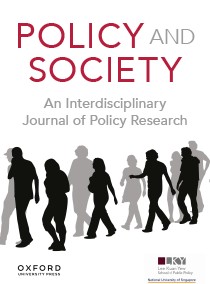Malignity in decentralization of natural resource governance in India
IF 6.1
1区 社会学
Q1 POLITICAL SCIENCE
引用次数: 0
Abstract
Many perspectives have been offered on what induces policy failures, which have been numerously called malignity, policy volatility, ill-intentioned policy behavior, abuse of public authority, prioritizing the interests of specific influential or identity interests, subverting policy goals and targets, and rent-seeking. Such a dark side of policy design is seen in India’s rollout of decentralization for natural resources. A discussion on malignant policy designs across states and sectors highlights the importance of understanding the political economy of institutional designs. This article points out that failing to account for the political economy of policy design for decentralization results in malignant designs. It also provides insights into developing policy designs to mitigate the influences of the erstwhile beneficiaries of centralization. The article brings insights from decentralization designs within a political economy framework and discusses mechanisms to mitigate malignant decentralization designs. It points to key policy design and implementation moments that create malignant behavior. It shares comparative instances where policies have been adapted to curb such behavior and strengthen devolutionary decentralization. It details how well-intended national policies towards devolutionary decentralization are intertwined with state and sub-state-level micro-politics of institutional design and decentralization.印度自然资源管理权力下放的弊端
关于导致政策失败的原因,人们提出了许多观点,许多人称之为恶意、政策波动、恶意的政策行为、滥用公共权力、优先考虑特定有影响力或身份利益的利益、颠覆政策目标和指标以及寻租。这种政策设计的阴暗面在印度推行的自然资源权力下放中可见一斑。关于跨州和部门的恶性政策设计的讨论强调了理解制度设计的政治经济学的重要性。本文指出,不考虑分权政策设计的政治经济学会导致恶性设计。它还为制定政策设计提供了见解,以减轻过去集中化受益者的影响。本文从政治经济学框架下的去中心化设计出发,探讨了缓解恶性去中心化设计的机制。它指出了产生恶性行为的关键政策设计和实施时刻。报告分享了一些比较的例子,说明哪些国家调整了政策以遏制这种行为和加强权力下放。它详细说明了意图良好的国家政策是如何与州和州以下一级的制度设计和权力下放的微观政治交织在一起的。
本文章由计算机程序翻译,如有差异,请以英文原文为准。
求助全文
约1分钟内获得全文
求助全文
来源期刊

Policy and Society
Multiple-
CiteScore
18.00
自引率
6.50%
发文量
43
审稿时长
30 weeks
期刊介绍:
Policy and Society is a prominent international open-access journal publishing peer-reviewed research on critical issues in policy theory and practice across local, national, and international levels. The journal seeks to comprehend the origin, functioning, and implications of policies within broader political, social, and economic contexts. It publishes themed issues regularly and, starting in 2023, will also feature non-themed individual submissions.
 求助内容:
求助内容: 应助结果提醒方式:
应助结果提醒方式:


